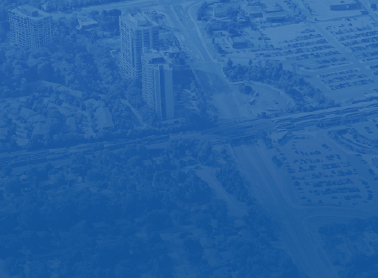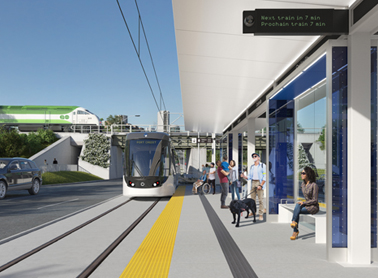Background
As our city continues to grow, the Province of Ontario is directing this growth to areas that can support it. This includes major transit station areas (MTSAs) in Peel and Mississauga. MTSAs are lands generally within a 500 to 800 metre radius (10 minute-walk) of a transit station or stop, primarily located along existing or planned transit corridors. We need to plan for expanded communities built around transit to ensure people can live and easily travel to the places they work, play and learn.
MTSAs are one component of the new Region of Peel Official Plan which was approved by the Province on November 4, 2022. Over 60 potential MTSAs were identified within Mississauga and these areas will be critical to how and where our city grows in the future.
MTSA dashboard
To help visualize the location and proposed boundaries of the potential MTSAs in Mississauga, a dashboard was developed. View the interactive map online (use Google Chrome for best experience) to find high-level information for each MTSA.
Project overview
The Region of Peel, in collaboration with local municipalities (Mississauga, Brampton and Caledon), has implemented policies that identify MTSA locations, boundaries and the minimum density (people and jobs) that can be accommodated within them.
Our current City of Mississauga Official Plan includes some general policies for MTSAs, but new policies are needed to guide their growth within the overall city urban structure.
The City has undertaken a number of studies that focus on specific MTSAs, such as Clarkson TSA, or groups of MTSAs along transit corridors such as Dundas Connects. When approved, these studies will update or refine existing Mississauga Official Plan policies to guide future growth that is supportive of various transit investments across the City and beyond.
Each of these studies have their own approval and public engagement processes:
- Clarkson Transit Station Area Study
- Uptown Node Character Area Official Plan Amendment
- Downtown Fairview, Cooksville and Hospital Policy Review
- Dundas Corridor Policy Implementation
- Inclusionary Zoning for Affordable Housing Study
Additional studies for other MTSAs are expected in the future.
Official Plan Amendments
As a result of the work from this project, a decision by City Council was made on August 10, 2022 to submit Official Plan Amendment Number 143 and Official Plan Amendment Number 144 to the Regional Municipality of Peel for approval (By-law 0214-2022 and respectively), which contain amendments to the Mississauga Official Plan related to MTSAs.
-
1Phase 1: Project launch
Winter 2020
-
2Phase 2: Community and stakeholder engagement
Fall 2021 to spring 2022
-
3Phase 3: Draft policy framework
May 9, 2022
-
4Phase 4: Final policy framework
August 8, 2022
-
5Phase 5: Region of Peel approval
In progress
Public engagement
Virtual and in-person community meetings were held throughout 2022, including information sessions with City staff and public meetings with the Planning and Development Committee.
Thank you to community members and stakeholders who participated and provided input during the public consultation period. (For reference, meeting presentations and files can be found below with other relevant project documents.)
Project documents
- Public Meeting Recommendations Report MTSA
- Appendix 1 – Written Letters
- Appendix 2 – Public Meeting Minutes
- Appendix 3 – Response to Comments Summary
- Appendix 4 – Revised Character Area Policies
- Appendix 5 – Revised Official Plan Schedules
- Appendix 6 – Policy Rationale
- Appendix 7 – Applicable Policy Analysis
- Public Meeting Notice for August 8, 2022
- City-Wide Major Transit Station Area Study – Official Plan Amendment
- Appendix 1 – Region of Peel – Major Transit Station Areas | Schedule E5
- Appendix 2 – MTSA Draft Official Plan Policy
- Appendix 3 – Schedule 11 Protected Major Transit Station Areas
- Public Meeting Information Report
- Public Meeting Notice for May 9, 2022
Frequently asked questions
Major Transit Station Areas (MTSAs) are lands generally within a 500 to 800 metre radius (a 10 minute-walk) of a transit station or stop, primarily located along existing or planned transit corridors, such as GO Train, Light Rail Transit or Bus Rapid Transit.
MTSAs will support future development around transit stations on existing or planned higher order transit corridors (such as Light Rail Transit (LRT), Bus Rapid Transit (BRT), and GO rail corridors).
They are required under the Province’s “A Place To Grow” as amended, and will encourage mixed-use, transit-supportive neighbourhoods that provide easy access to local amenities, jobs, housing, and recreation opportunities.
The Region of Peel has worked with the City of Mississauga to identify the boundaries for each MTSA which will be included in the Regional Official Plan along with general policies and requirements. The City is required to develop detailed policies for MTSAs in the City’s Official Plan to bring them into line with the Regional work.
Currently the Region of Peel is suggesting 54 stations within the City of Mississauga. The stations are along current transit corridors such as Hurontario, Highways 403 and 407, as well as the Kitchener, Milton and Lakeshore West GO Rail lines. They are found along future transit corridors along Lakeshore East and Dundas Street.
The proposed boundaries and locations of the MTSAs are available on the Regional website (shown in Schedule E-5 pf Peel 2051). Please send any questions on the proposed locations and density targets to through the Region’s website.
Based on the Region of Peel’s MTSA policy requirements, the City is proposing an amendment to the Mississauga Official Plan that will include new policies and mapping, that identify:
- Locations of MTSAs
- Land use designations and uses
- Building height requirements
- Minimum MTSA wide density represented in Floor Space Index
- All MTSAs classified as Protected
- Requirement for development to provide a balanced mix of residential and non-residential uses
- Policies to maintain existing non-residential and employment uses
- The need for public realm improvements, community amenities, land use compatibility, and increased connectivity within MTSAs
No. The City has done detailed analysis, which has shown that in most MTSAs the current policies can achieve the minimum density targets and no significant changes are required. In some MTSAs, primarily those along the 403 Transitway, there are limited opportunities to achieve certain density targets, and the Region has identified alternative targets.
The City is also undertaking studies for specific MTSAs to review current policies. Once completed and approved, the recommended changes related to land use designations and building heights will be included as part of the MTSA official plan amendment. Current studies include:
There are currently 8 planned MTSAs identified by the Region of Peel with no defined boundaries or density targets. There may be more MTSAs that will be defined and outlined as additional transit stations and transit corridors are developed. This will require the Region of Peel to amend their Official Plan before the City adds any other MTSAs.
Creating MTSA policies within the Mississauga Official Plan will help reach several goals for the City, which will:
- Update City policies to conform to Regional and Provincial requirements
- Set the geographic area where Inclusionary Zoning can apply. Inclusionary zoning is a policy tool that enables municipalities to require affordable housing units in new residential development. More information is available on the City’s Inclusionary Zoning for Affordable Housing Study website.
- Provide policy protection for land uses, heights, and densities that will further strengthen the City’s long-term vision for growth. Within MTSAs, these policies will be protected from appeal and amendment, making sure future growth and development respects the policies that have been approved by City Council.
- Support transit investment by managing growth along corridors to promote transit ridership, making efficient use of transit infrastructure, and improving access to transit.
- Create common City-wide MTSA objectives, such as requiring a balanced mix of uses including employment, replacing existing non-residential uses, prioritizing pedestrian and cycling access to stations, improving access to public amenities, and providing for high quality public realm improvements and land use compatibility, among others.
Two things must happen before the City’s MTSA policies can take effect. First, the Province must approve the Peel 2051 Regional Official Plan (2051 PROP) containing the Region’s MTSA policies which were adopted by Peel Regional Council on April 28, 2022. Second, the City’s MTSA polices must be approved by Mississauga Council before the Region of Peel can give approval and the City’s MTSA policies can take affect. The City is targeting to bring the final version of the policies to Mississauga Council by the summer of 2022.

